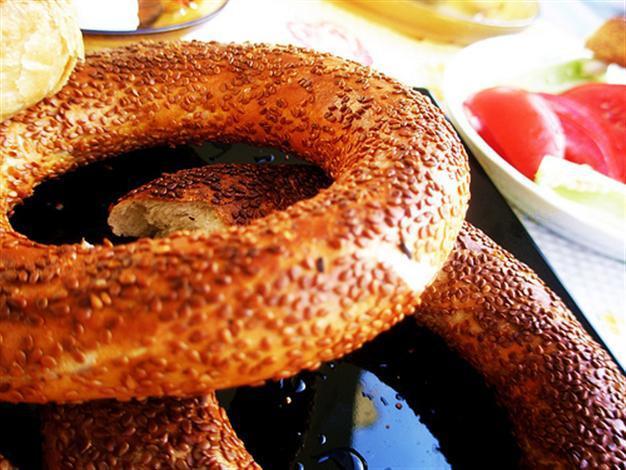Simit, ‘daily food of poor,’ whets foreign appetite
ISTANBUL- Hürriyet Daily News

Simit Sarayı and several other restaurant chains have taken simit, the Turkish bagel, indoors, creating a new sector. AA photo
Simit, once a very local taste generally considered the cheapest meal for poor people, has turned into a large business dominated by chain restaurants and attracting foreign investors.Dubai’s Abraaj Capital and U.S. Colony Capital are competing for a 50 percent stake in Turkey’s Simit Sarayı, the top brand that has proved the great commercial potential of the simple food, according to its president, Abdullah Kavukçu.
“We will not sell it for less than $500 million,” daily Hürriyet quoted Kavukçu as saying yesterday.
The company, which has already expanded abroad with 18 branches, is also planning a public offering in the first six months of 2013 for between 10 and 15 percent of its shares, Kavukçu said.
Simit, which might be loosely defined as a Turkish bagel topped with sesame seeds, is a traditional form of pastry dating back to the 14th century, and was mainly sold by street vendors throughout the Ottoman Empire as well as in the modern Turkish Republic. Simit is the common name of dozens of similar products across Turkey and Simit Sarayı simit is a variation of the Istanbul type.
With well-deserved fame as the best accompaniment to Turkish tea and local types of cheese, it was also appreciated in court cuisine. Luxury restaurants still continue a more elegant simit tradition; however, the main group of consumers has become low and middle-income people who choose local simit over other fast-food options in the modern urban race against time.
'A Turkish brand'
Simit Sarayı, launched in 2002 as a bakery-cafe enterprise, was a pioneer of a new kind of business that offered simit in specialized restaurants at affordable prices and has encouraged many others.
“We have never considered selling Simit Sarayı in full,” Kavukçu said. “It is a Turkish brand, and we want it to remain so.”
However, the company is prepared to leave management of the brand to the future partner if this would help Simit Sarayı become a world brand, he said.
Simit Sarayı currently sells 83,000 simits on an average day, reaching 150 million Turkish Liras in annual revenues in 2012. Some 40 percent of the income comes from simit and tea sales, the executive said. It serves 400,000 customers daily, and the 204 restaurants of the chain sell other pastry products. Simit Sarayı plans to increase the number of stores to 280 this year.
“We will use the capital from the share sale in the simit business. We are not considering doing another job.”
Last year, a move to obtain a patent for simit by the Istanbul Simit Sellers Chamber drew a negative reaction in Greece as the neighboring country has discussed the pastry being originally Greek.
















